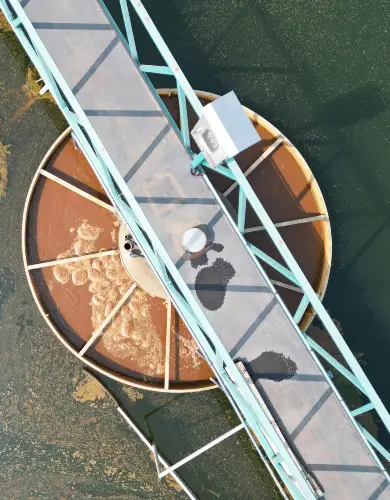Business water suppliers going bust
The principal idea behind the deregulated business water industry is that private companies can apply for a retail licence and compete with other suppliers to offer water services.
Without business water suppliers, water companies are a natural monopoly, compelling customers to pay water bills issued by their local water company. Introducing competition among suppliers enhances service levels and helps keep prices low.
Unfortunately, a natural by-product of competition is that underperforming suppliers may go bust.
In this article, we cover everything you need to know about business water suppliers going out of business, including:
- What to do if your business water supplier goes bust
- What’s the process for business water suppliers going bust?
- Which business water suppliers have gone bust?
- What happens if a big business water supplier fails?
💡A quick clarification: This article focuses on business water suppliers (sometimes known as ‘retailers’) going bust. These suppliers provide billing and customer services in the commercial water market. They are not local water companies (Thames Water, etc.) that actually own and operate British water infrastructure.
What to do if your business water supplier goes bust
The process for water suppliers going out of business ensures that your business remains protected if your water supplier fails.
The regulator will facilitate the transfer of your supply to a new business water supplier, ensuring that your business water connection is not disrupted.
Regulators advise against taking any immediate action upon hearing that your business water supplier is going bust. They will appoint a new business water supplier who will contact you once the transfer is complete.
💡Once your new supplier has notified you, we recommend using our business water comparison service to check the competitiveness of your new rates.
Any debts owed by you, or credits owed to you, will remain the responsibility of your former water supplier.
💡In previous instances of business water suppliers going bust, Ofwat has provided specific guidance for affected customers on a dedicated page.
What’s the process for business water suppliers going bust?
The English water regulator, Ofwat, and the market operator, MOSL, have established a procedure to manage the failure of business water suppliers. This process ensures that:
- There is no interruption to water supplies due to a supplier going out of business.
- There is an automatic and timely transfer of customer water supply points to a new business water supplier.
In this section, we’ll summarise Ofwat’s process for a business water supplier in financial distress.
Ofwat trigger interim supply event
The regulator, Ofwat, initiates customer transfers when a business water supplier appears to be in financial distress.
Ofwat has the authority to activate this procedure if a supplier violates any of the following water retailer licence conditions:
- The supplier is likely to be unable to pay its debts.
- The supplier has initiated a voluntary arrangement or winding up.
- A judge has appointed a company administrator or receiver.
- The supplier’s failure to pay their water retail licence fee or an enforcement penalty.
- The supplier’s management is convicted of an offence relevant to their water licence.
- A member of the supplier’s management is declared bankrupt.
Source: Defra – Water supply and sewerage licence conditions – section 10 Revocation
Furthermore, Ofwat can initiate the allocation process if a retailer fails to pay a local water company for the water its customers use.
Transfer offers made to remaining business water suppliers
The market operator, MOSL, will inform all remaining business water suppliers that a supplier’s licence has been revoked.
These remaining suppliers are then entitled to make an ‘Interim Supply Offer,’ whereby they volunteer to take on the failed supplier’s customer base.
Ofwat will review these voluntary supply offers and, if deemed satisfactory, distribute the customer base among them.
💡The allocation of customers based on multiple supply offers occurred in the failure of TOR Water, where customers were distributed among four different retailers.
If the offers received do not meet Ofwat’s criteria, or if no offers are received, the customer base will be distributed according to the interim supplier allocation process.
Interim supplier allocation process
The water supply rules establish a definitive automatic process to calculate the allocation of customers to remaining suppliers.
Under this mechanism, the supply points are evenly divided among suppliers that have opted into an interim supply allocation list, which MOSL maintains.
New business water supplier obligations
The regulator, Ofwat, stipulates obligations for the new retailer regarding transferred business water customers to ensure their protection. These obligations include:
- Offering fair pricing terms equivalent to those provided to their existing customer base.
- Communicating with transferred customers to explain the conditions of the new water contract.
- Ensuring no restrictions on the transferred customers’ ability to switch to another business water supplier.
What notices will customers receive?
Ofwat mandates that a water supplier receiving new customers due to a business water supplier going bust must provide affected customers with:
- Notification of their transfer explaining why this has occurred.
- The date of transfer
- Advice on settling any outstanding service requests with the old supplier.
- A copy of new supply terms and conditions.
- Confirmation that the customer is out of contract and free to switch to another supplier.
Which business water suppliers have gone bust?
Since 2020, four business water suppliers have ceased operations for various reasons, including financial difficulties or acquisition by another supplier.
Pinnacle Business Water
Went out of business: November 2022
Customers transferred to: Everflow water
Pinnacle Business Water, established in 2018, was an independent water retailer known for offering a personal, high-quality service in the Scottish water market.
In November 2022, Pinnacle entered into a voluntary arrangement with Everflow Water to transfer its entire portfolio of business customers. The Water Industry Commission for Scotland (WICS) approved this transfer, and subsequently, Pinnacle’s retailer licence was revoked.
Affinity for business
Went out of business: July 2021
Customers transferred to: Castle Water
Affinity for Business was the original default business water supplier for the Affinity Water area, covering several North London boroughs and parts of Essex, Surrey, and Kent.
Castle Water purchased Affinity for Business for £9.4 million. At the time of the sale, Affinity for Business served 50,000 customers.
Aimera Water
Went out of business: July 2021
Customers transferred to: Clear Business Water
Aimera Water, headquartered in Paisley, Scotland, focused on providing the most competitive business water rates in Scotland’s open water market.
The Verastar Group acquired Aimera Water, and its customers were transferred to Clear Business Water, another group member.
TOR Water
Went out of business: February 2020
Customers transferred to: Smarta Water Limited, SES Business Water, Water2Business, and Yu Water.
TOR Water focused on supplying businesses in the South West following the deregulation of the English water market.
Ofwat revoked TOR Water’s licence due to its failure to make payments to South West Water for the water used by its customers.
For more information, refer to our guide to what happened to TOR water.
What happens if a big business water supplier fails?
The recent instances of business water supplier failures have involved either suppliers with a small customer base going out of business or the orderly acquisition of one supplier by another.
This section will explore the consequences of a larger water supplier going out of business.
💡Our focus will be on the English Water Market, which is dominated by a few large suppliers and where prices are more strictly regulated by Ofwat.
Market concentration
Since 2017, businesses in England have been able to choose their supplier of water and sewerage services.
However, the market has developed slowly, and the vast majority of English companies continue to use their default business water supplier.
According to MOSL’s supply point dashboard, the four largest default water suppliers—Water Plus, Castle Water, Wave, and Business Stream—supply over 75% of customers in the market.
This concentration of the market into a few suppliers heightens the risks associated with a disorderly default by one of these suppliers.
💡For the latest information on competition among business water suppliers, visit our business water suppliers page.
Price Controls in the English Water Market
The vast majority of customers with the four largest suppliers are charged under a default business water tariff.
Default business water rates are carefully controlled by Ofwat to protect businesses that have not switched business water suppliers from unfair price increases.
💡For more information, here’s a link to our page on business water price increases.
The default price cap directly restricts the profitability and, consequently, the solvency of the four largest suppliers in the market.
Profitability of business water suppliers
Our experts have reviewed one of the largest business water suppliers’ latest public financial statements to assess their solvency.
The following table extracts key financial information from the year ended 31 March 2023 of the four largest suppliers:
| Business Water Supplier | Castle Water | Water Plus | Wave | Business Stream |
|---|---|---|---|---|
| P&L - £'000s | ||||
| Revenue | 436,016 | 730,891 | 434,970 | 657,400 |
| Gross Profit | 42,566 | 69,147 | 31,484 | 58,500 |
| Operating Profit/(Loss) | 222 | 13,115 | 5,659 | 2,300 |
| Operating profit margin | 0.05% | 1.79% | 1.30% | 0.35% |
| Profit/(Loss) before tax | -8,620 | 1,677 | 2,350 | 3,600 |
| Balance Sheet - £'000s | ||||
| Borrowings | 95,796 | 214,435 | 73,365 | 0 |
| Net assets/(liabilites) | -5,578 | 13,820 | 52,607 | 115,000 |
| Owner: | Privately owned | Severn Trent and United Utilities | Northumbrian Water | Scottish Water |
From this review, there are four indicators that the failure of one of these large suppliers is possible:
- The operating profit margins of the largest suppliers are extremely thin, ranging from zero to 2%.
- Three out of the four largest suppliers are highly leveraged, owing substantial amounts of debt.
- Three of the four are owned by local water companies that are also under financial strain due to increasing water scarcity, Ofwat price controls, and pressures to upgrade infrastructure to reduce dumping of untreated sewage into rivers.
- All of the suppliers carry a significant amount of credit risk. If a large number of customers fail to pay their business water bills, the financial position of the suppliers will rapidly deteriorate.
We can conclude from this high-level review of publicly available financial data that the failure of a large business water supplier is possible.
Could a large business water supplier failure be managed?
Ofwat’s process for managing business water supplier failures depends on the availability of other retailers who can take on the financial and operational responsibilities of transferred customers.
Each of the four largest water suppliers has a customer base exceeding 350,000 water supply points, representing over 10% of the market. Transferring such large numbers of customers could potentially pose challenges to the receiving suppliers.
While this next point is purely speculative, our business water experts suggest a scenario akin to that of Bulb (a business energy supplier), which was placed into special administration because Ofgem was unable to find a suitable new supplier.
💡The bailout of Bulb is estimated to have cost the government £246 million pounds. For more information, visit our page on energy suppliers going bust.

